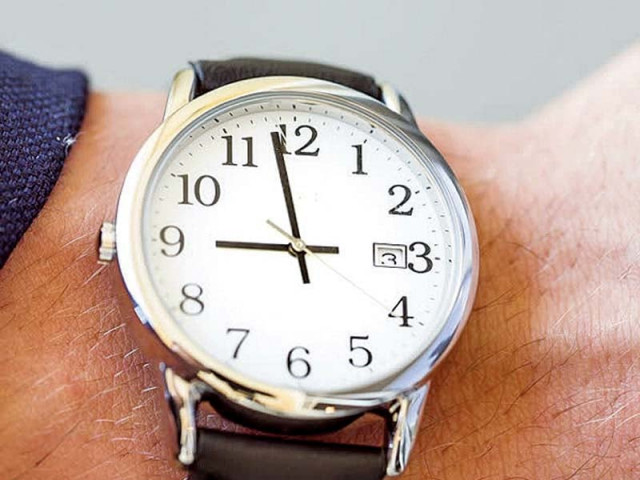5 habits of people who are never late
Here are ways always-prompt people stay on roster

They don’t blame their situations
Disclaimer: Being late is a 100% your fault. It’s punitive, but it’s true. In the contemporary world of obstacles and interruptions, something always comes up. But as much as you want to play victim to the universe, it actually doesn’t matter what happened. “It’s always on you to show up on time,” says Kevin Kruse, time management expert and author of 15 Secrets Successful People Know About Time Management. He cites an interesting conversation with a former boss: “When I was really young I got to work 10 minutes late one day and I explained to my boss that I left at my normal time but there was a horrible accident on the highway and there was nothing I could have done. He said, ‘If I told you yesterday that I’d give you a million dollars if you showed up exactly at 9 am, do you think that accident would have delayed you?’ I quickly realised that given his scenario I probably would have left much earlier or even camped out the night before to ensure timeliness.” And while no one is suggesting that you camp out near your office every night, this scenario proves the point that it’s always possible to be on time when it matters.
They value other people’s time
Repeat after me: being late is discourteous. Consider this the second step to admitting you have a problem. “Making someone wait is just plain disrespectful,” explains Lizzie Post, etiquette expert and host of the Awesome Etiquette podcast. “It relays the message that whatever you’re doing is more important than them waiting.” Kruse concurs, adding: “It’s basically saying that your time is more valuable than theirs, which is never the case. All time is created equal, no matter who you are.” Some researchers think that chronic latecomers more often have a Type-B personality, which tends to be more relaxed and have a more flexible perception of time. In fact, one study found that Type-B people perceive a minute as 77 seconds while Type-A individuals perceive it as 58 seconds. While you may not be able to change your disposition overnight, Post suggests doing an experiment to give yourself perspective: “Try sitting for one minute without your phone or any distractions. It goes by pretty slowly! That’s how it feels to be waiting for someone.” There you go! You get it now, don’t you?
They’re pessimistic about the clock
We’re staunch believers that optimism makes life a whole lot superior — except when it comes to time. Chronic latecomers abide by what are called time unicorns: unusual situations in which they made it somewhere or did something in record speed. “They think it takes 20 minutes to get to work because it did, once, when they left at 6 am. But they normally leave at 8 am., when there’s traffic and it takes at least 35 minutes,” says Laura Vanderkam, time management expert and author of What The Most Successful People Do Before Breakfast. A study published in the Journal of Personality and Social Psychology found that people generally dismissed similar past experiences when trying to pinpoint how long it would take them to do something, with researchers describing participants’ estimates as “too optimistic.” The solution: For various situations, set a timer from the moment you begin until the minute you finish.
They always work backwards
Late people tend to plan forward, meaning they roughly estimate how long it’s going to take them to do something, pick an arbitrary start time, and aim to finish by a designated time. This method is often a recipe for trouble. “Looking into the future can be very vague, especially if you are a chronically late person and continually underestimate your time,” explains Post. “Using a window of time, even if it’s a couple hours, may not give you the accurate amount that you need.” So instead of adding, subtract. Identify the time you need to be ready by and then subtract the time it takes to do every task on your list, so you arrive at an accurate starting point. In fact, it’s a more realistic assessment of your schedule.”
They break down complex tasks
A major reason people are late is that they forget that certain big projects have many smaller, time-consuming subcomponents. Instead they just focus on the larger end goal. Let’s say you are hosting a post-Eid summer barbeque, and you’re going big. That means you’ll be decorating, cleaning, prepping, and cooking. Did you factor in the excursions to the grocery store, which has long lines on weekends? Did you calculate how long it will take you to get ready, shower, pick out clothes, and do hair and makeup? “Hosts will tell me that they were running behind because they didn’t consider all the prep work, like washing and cutting the vegetables or waiting for the meat to marinate or even waiting for the floors to dry before guests can come in because they mopped too late,” Post says. One study by the University of Illinois found that when people break down big projects into smaller tasks, they are truly able to more accurately estimate how long it will take them to get things done. Research from San Diego State University found that multi-tasking hikes up delay, since it can be hard to keep track of time when you’re being pulled in many directions.
Umnia Shahid
Published in The Express Tribune, July 12th, 2016.
Like Life & Style on Facebook, follow @ETLifeandStyle on Twitter for the latest in fashion, gossip and entertainment.



















COMMENTS
Comments are moderated and generally will be posted if they are on-topic and not abusive.
For more information, please see our Comments FAQ